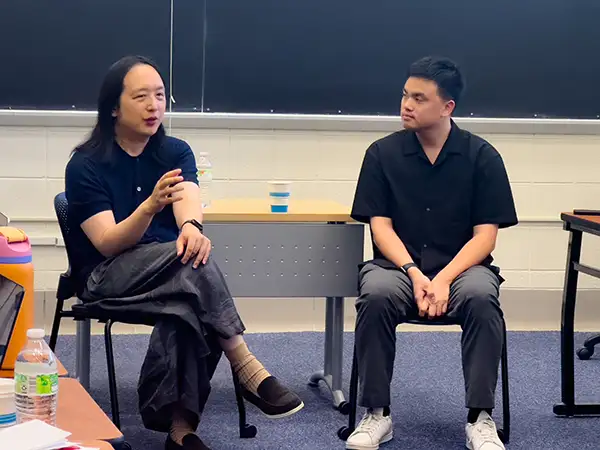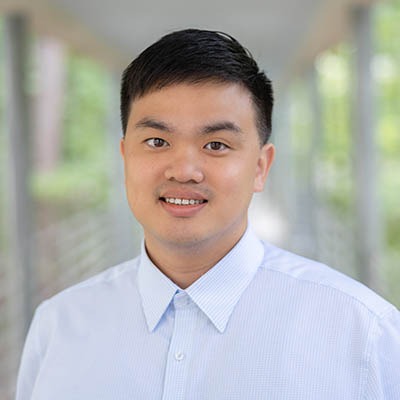News
.Back to listing
Sat, Apr 26
When Technology Serves Democracy: Insights from Cyber Ambassador Audrey Tang’s Duke Visit
It was a tremendous honor to welcome Audrey Tang to Duke University. Tang was contacted when Professor Tommy Sowers challenged students in his Science, Technology, Ethics, and Leadership class to invite inspiring industry and thought leaders to speak in class. Tang is Taiwan’s first Digital Minister, renowned for leading a series of pioneering digital initiatives that have transformed democratic practices. She now serves as Taiwan’s Cyber Ambassador, continuing her mission to share the spirit of digital democracy with the world.

During her visit to Duke, Tang engaged with students from Science and Society, Public Policy, and various members of the public. She eloquently shared how she has leveraged digital technology to foster public discourse and crowdsource policymaking. For instance, to combat fraudulent advertisements on social media platforms, her team did not rely solely on expert panels. Instead, they randomly invited citizens of all age groups and ethnic backgrounds to express their opinions through text messages and participate in an open discussion on an online platform, akin to a jury system. Through this radically inclusive process, innovative and broadly supported solutions quickly emerged, leading to the efficient and effective implementation of new policies within a few months.
At the core of Tang’s work is the concept of Plurality. Rather than accepting the idea that technology and democracy must be in conflict, Plurality envisions a future where collaborative technologies enhance democratic values. It advocates for open and decentralized systems that bridge social, cultural, and political divides. In contrast to centralized technologies that reinforce authoritarianism and social fragmentation, Plurality aims to protect digital human rights, foster participatory governance, and create new pathways for collective action. From Taiwan’s platform to decentralized governance models around the world, Tang demonstrates how Plurality is already facilitating more empathetic, inclusive, and democratic societies.
Her visit was more than a presentation; it served as a living example of how an interdisciplinary and ethically driven technologist can advance democracy through innovation. After her talk, a classmate approached us and said with emotion, “It was so inspiring seeing that there is actually someone realizing this ideal.” Tang’s work made tangible the connection between ethics, technology, and the public good, inspiring many of us to envision new possibilities.

As a Taiwanese, having Audrey Tang at Duke carried an even deeper meaning for me. Taiwan is a young democracy with a vibrant technological landscape. The Taiwanese people continuously fight for freedom and embrace innovative ways to improve collective well-being. She embodies this spirit fully. Through her visit, many at Duke glimpsed the resilience, creativity, and optimism of Taiwan, and I am proud that they learned about my home through her example.
Watch Audrey Tang’s presentation on our YouTube Channel.
Interested in learning more about Audrey Tang’s work?
Check out these tools and resources she mentioned during her talk:
- ROOST Tools – Robust Open Online Safety Tools for builders.
- Project Liberty – building solutions that help people take back control of their digital lives by reclaiming a voice, choice, and stake in a better internet.
- Gov-zero – a decentralized civic tech community with information transparency, open results and open cooperation as its core values.
- “Conversation Networks” – a recent position paper co-authured by Audrey Tang that introduces the idea of conversation networks as a basis for civic communication infrastructure that combines interoperable digital apps with the thoughtful integration of AI guided by human agency.
- What Could BG Be? – a U.S. example in practice. This month-long, online conversation was hosted by the BG 2050 Project. Over the course of 33 days, 7,890 local residents of Warren County shared 3,940 unique ideas for the future of Warren County and weighed in 1,034,868 times.
 Jiunn-Tyng Yey
Jiunn-Tyng Yey
Jiunn-Tyng Yeh (Tyng) is a candidate in the Duke University Master of Arts in Applied Ethics & Policy. He obtained his M.D. from National Yang Ming Chiao Tung University in Taiwan in 2022 and completed a Ph.D. in Neuroscience at the University of Missouri-Columbia in 2019. Prior to his graduate studies at Duke, Tyng underwent a general residency physician training in Taiwan for a year, then worked as a postdoctoral researcher at the Center for Artificial Intelligence in Medicine at Chang Gung Memorial Hospital in Taiwan. His research interests include the integration of AI in clinical settings, and the ethical implications and policy frameworks of neurotechnology.

